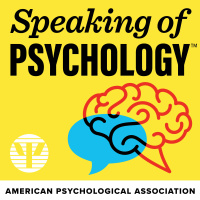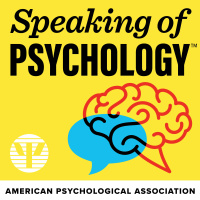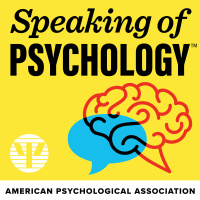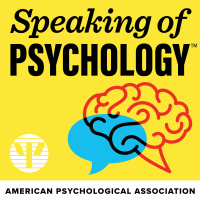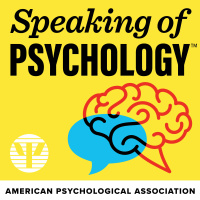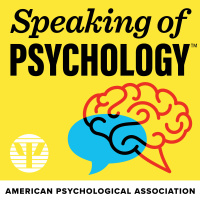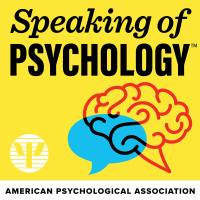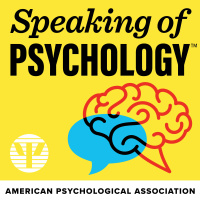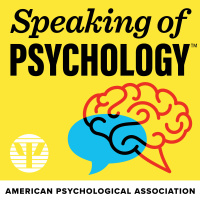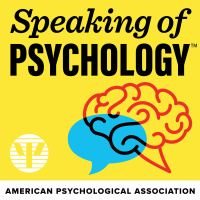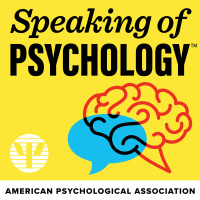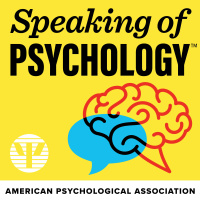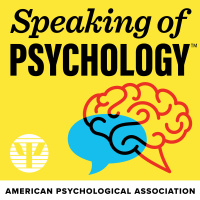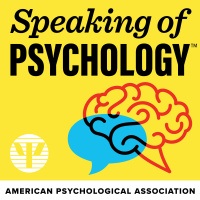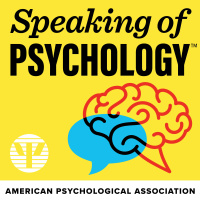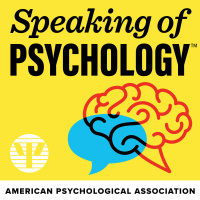Sinopsis
"Speaking of Psychology" is an audio podcast series highlighting some of the latest, most important and relevant psychological research being conducted today. Produced by the American Psychological Association, these podcasts will help listeners apply the science of psychology to their everyday lives.
Episodios
-
How to support children after traumatic events, with Robin Gurwitch, PhD
17/09/2025 Duración: 31minFrom hurricanes to wildfires to gun violence, trauma and disaster touch the lives of millions of children each year. Robin Gurwitch, PhD, discusses how disasters affect children’s mental health, how to support children and teens in the aftermath of disasters, and how parents can talk to their children about traumatic events in the news. Learn more about your ad choices. Visit megaphone.fm/adchoices
-
Financial scams: Why some older adults are at risk, with Duke Han, PhD
10/09/2025 Duración: 24minFinancial scams targeting people over age 60 cost victims more than $3.4 billion in 2023. Neuropsychologist Duke Han, PhD, talks about why some older adults are at risk, financial vulnerability as an early sign of Alzheimer’s disease, and how people can protect themselves and their loved ones from falling victim to a scammer. Learn more about your ad choices. Visit megaphone.fm/adchoices
-
Hot flashes, heart health and hormones: Rethinking menopause, with Rebecca Thurston, PhD
03/09/2025 Duración: 33minFor many women, the shifting hormones of midlife bring troubling symptoms like hot flashes, mood and memory changes. Now, researchers are learning more about the short- and long-term health effects of menopause. Clinical health psychologist Rebecca Thurston, PhD, discusses links between menopause symptoms and long-term cardiovascular and Alzheimer’s risk; evolving treatments, including hormone therapy and non-hormonal options; and why midlife can be an empowering as well as challenging time for women. Learn more about your ad choices. Visit megaphone.fm/adchoices
-
Why “boy" culture is creating a crisis of connection, with Niobe Way, PhD
27/08/2025 Duración: 41minMany boys form deep friendships in childhood. But as they become teens, they report fewer close, rich friendships. Niobe Way, PhD, author of “Rebels With a Cause: Reimagining Boys, Ourselves and Our Culture,” discusses “boy" culture; why boys are naturally as emotionally intelligent as girls; the societal pressures that lead to disconnection among boys as they grow into men; and how teaching students to listen with curiosity can help them deepen connections and friendships. Please take our listener survey at at.apa.org/SoPSurvey Chapters 01:37 Understanding Boy Culture and Its Impact 03:43 The Evolution of Boys' Friendships 10:04 Why Boys and Men are Struggling 20:22 Cultural Insights from Boys and Men of Color 24:46 "Boy" Culture in China 31:29 Listening with Curiosity: A Path to Connection Learn more about your ad choices. Visit megaphone.fm/adchoices
-
Why numeracy counts in everyday life, with Ellen Peters, PhD
20/08/2025 Duración: 35minFrom deciding whether to buy a house to weighing the risks and benefits of taking a new medication, many important life decisions hinge on understanding numbers, statistics and probability. Ellen Peters, PhD, author of “Innumeracy in the Wild: Misunderstanding and Misusing Numbers” discusses what it means to be numerate; how numeracy affects people’s health, financial security and other life outcomes; and how can you improve your confidence and ability with numbers. Please take our listener survey at at.apa.org/SoPSurvey. Learn more about your ad choices. Visit megaphone.fm/adchoices
-
Encore - How science can help you change your behavior for the better, with Katy Milkman, PhD
13/08/2025 Duración: 43minWhat can you learn from the science of behavior change that can help you make the changes you want to see in your life? Katy Milkman, PhD, a professor at the Wharton School of the University of Pennsylvania and author of the book How to Change: The Science of Getting From Where You are to Where You Want to Be, discusses the importance of accurately identifying the behavioral roadblocks standing in your way, how specific strategies such as “temptation bundling” and creating fresh starts can help you achieve your goals, how to turn laziness to your advantage by setting the right defaults, and more. Please take our listener survey at http://at.apa.org/SoPSurvey Learn more about your ad choices. Visit megaphone.fm/adchoices
-
Encore -- Why we choose to suffer, with Paul Bloom, PhD
06/08/2025 Duración: 23minWhy do people like to watch scary movies or listen to sad songs? Why do we run marathons and raise children, even though both of those pursuits come with struggle and pain? Paul Bloom, PhD, discusses why suffering is linked to meaning in life, the connection between pleasure and pain, and the difference between chosen and unchosen suffering. Please take our listener survey at http://at.apa.org/SoPSurvey Learn more about your ad choices. Visit megaphone.fm/adchoices
-
Encore -- Why is it so hard for adults to make friends? With Marisa Franco, PhD
30/07/2025 Duración: 33minAs an adult, making new friends—and maintaining old friendships—can be tough. Life is busy and friends end up taking a backseat to other relationships and responsibilities. Marisa Franco, PhD, psychologist and friendship expert, talks about how to make new friends and strengthen and rekindle old friendship ties, why Americans’ friendship networks are shrinking, the differences between men’s and women’s friendships, and more. Please take our listener survey at http://at.apa.org/SoPSurvey Learn more about your ad choices. Visit megaphone.fm/adchoices
-
What the movies get right (and wrong) about relationships, with Paul Eastwick, PhD, and Eli Finkel, PhD
23/07/2025 Duración: 39minFor many of us, movies offer our earliest lessons in love and help shape our expectations about what romance and relationships might look like. Relationship researchers Paul Eastwick, PhD, and Eli Finkel, PhD, are cohosts of the podcast “Love Factually,” where they use psychology to dissect their favorite rom coms. They talked to “Speaking of Psychology” about how films depict dating and relationship truths and myths, and how well our favorite characters’ love stories hold up when analyzed through the lens of science. Please take our listener survey at http://at.apa.org/SoPsurvey Learn more about your ad choices. Visit megaphone.fm/adchoices
-
Can AI help solve the mental health crisis? With Vaile Wright, PhD
16/07/2025 Duración: 31minPeople are increasingly turning to chatbots for mental health advice and support – even as researchers work to develop safe, evidence-based AI mental health interventions. Vaile Wright, PhD, discusses the promises, limitations and risks of AI in mental health; how AI tools are already being used in mental health care; how these tools could help expand access to care; and how AI might change what therapy looks like in the future. Please take our listener survey at http://at.apa.org/SoPSurvey Learn more about your ad choices. Visit megaphone.fm/adchoices
-
Why can’t you remember being a baby? With Nicholas Turk-Browne, PhD
09/07/2025 Duración: 42minWhy can’t you remember your first birthday party? Or the house you lived in at age 2? Nicholas Turk-Browne, PhD, talks about new studies that suggest that babies and toddlers may form early memories; why we aren’t able to retrieve them as adults; and how evolving brain imaging techniques could help answer these questions – and help us understand more about what it’s like to be a baby and how babies experience the world. Take our listener survey at http://at.apa.org/SoPSurvey. Learn more about your ad choices. Visit megaphone.fm/adchoices
-
How to be happier, with Sonja Lyubomirsky, PhD
02/07/2025 Duración: 35minWant to be happier? Some of our happiness level is due to genes or life circumstances, but research shows much of it is within our control. Sonja Lyubomirsky, PhD, talks about the habits and mindsets that lead to lasting happiness, the complex relationship between money and happiness, whether technology is making us less happy, and whether it’s possible to worry too much about being happy. Find Dr. Lyubomirsky's newsletter The Happiness Files at https://drsonja.kit.com/newsletter. Take our listener survey at http://at.apa.org/SoPSurvey. Learn more about your ad choices. Visit megaphone.fm/adchoices
-
The psychology of wealth, empathy and entitlement, with Paul Piff, PhD
25/06/2025 Duración: 45minCan money make you mean? Most of us like to think we’d stay grounded if we were to become wealthy, but psychologists’ research suggests that money, status and power shape people’s beliefs and behavior – sometimes in surprising ways. Paul Piff, PhD, of the University of California, Irvine, talks about money, fairness and empathy; the relationship between money and happiness; and the implications of rising income inequality. Learn more about your ad choices. Visit megaphone.fm/adchoices
-
Coping with job insecurity, with Mindy Shoss, PhD
18/06/2025 Duración: 35minBetween economic uncertainty, the rise of AI and major changes in government policy, many U.S. workers feeling stress. A recent survey found more than half of U.S. workers report stress due to job insecurity. Mindy Shoss, PhD, talks about the future of work, including how AI and technology may reshape job roles; how job insecurity affects mental and physical health; coping strategies; and the role of employers in fostering a supportive work environment in uncertain times. Take our listener survey at https://at.apa.org/SoPsurvey Learn more about your ad choices. Visit megaphone.fm/adchoices
-
“Dad brain”: How becoming a parent changes the brain, with Darby Saxbe, PhD
11/06/2025 Duración: 36minBecoming a parent is a huge life transition. Now, researchers are finding evidence that parenthood actually changes the brain – and these changes happen to fathers as well as to mothers. Darby Saxbe, PhD, talks about the hormonal and brain shifts that occur in new moms and dads; the advantages and risks these changes confer; why paternity leave matters; and how to support people as they become parents. Take our listener survey at https://at.apa.org/SoPsurvey Learn more about your ad choices. Visit megaphone.fm/adchoices
-
Attachment bonds: Understanding our closest relationships, with Ximena Arriaga, PhD
04/06/2025 Duración: 36minWhat makes us feel secure, safe and supported in our relationships with partners, friends and family? Ximena Arriaga, PhD, talks about how early and ongoing life experiences shape our bonds with others, why our “attachment style” isn’t fixed but can always change, and how partners can help each other thrive in their close relationships. Learn more about your ad choices. Visit megaphone.fm/adchoices
-
Time going too fast? How to slow it down, with Ruth Ogden, PhD
28/05/2025 Duración: 37minWhy does time fly when you’re having fun – and slow to a crawl when you’re not? Ruth Ogden, PhD, talks about how our experiences and emotions influence our sense of time, why time seems to go by faster as we get older, why changing to daylight saving time feels so disruptive and why the COVID-19 pandemic did strange things to many people’s sense of time. Learn more about your ad choices. Visit megaphone.fm/adchoices
-
Building resilience in the face of adversity, with George Bonanno, PhD
21/05/2025 Duración: 36minNo one gets through life without encountering adversity. But many people survive terrible things without lasting trauma. George Bonanno, PhD, talks about how humans cope with extreme life events, the factors that lead to resilience in the face of adversity, and how cultivating cognitive flexibility can help us handle difficult times. Learn more about your ad choices. Visit megaphone.fm/adchoices
-
Digging out: Can we help people with hoarding disorder? With Mary E. Dozier, PhD
14/05/2025 Duración: 31minHoarding disorder affects about 2 percent of the population and is more common among older adults. Psychologist Mary E. Dozier, PhD, talks about the causes of hoarding disorder, its links to other mental health disorders, why many people who hoard are highly altruistic, and how a values-based intervention can help them – and others who struggle with clutter. Learn more about your ad choices. Visit megaphone.fm/adchoices
-
How moms can help their daughters build a healthy body image, with Janet Boseovski, PhD, and Ashleigh Gallagher, PhD
07/05/2025 Duración: 42minGirls begin receiving messages that will shape their body image as young as preschool. Janet Boseovski, PhD, and Ashleigh Gallagher, PhD, author of “Beyond Body Positivity: A Mother's Science-Based Guide for Helping Girls Build a Healthy Body Image,” talk about how kids understand body image from early childhood through the tween years and why parents’ early influence is so important. Learn more about your ad choices. Visit megaphone.fm/adchoices



